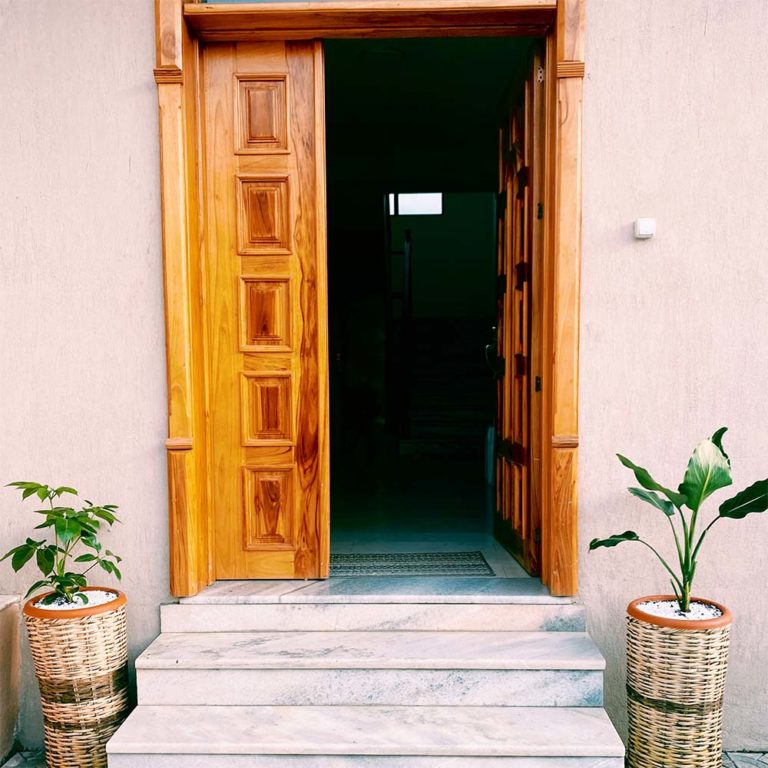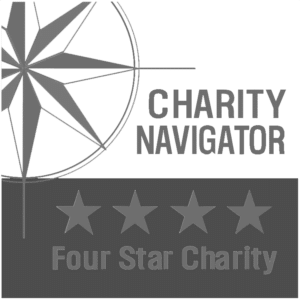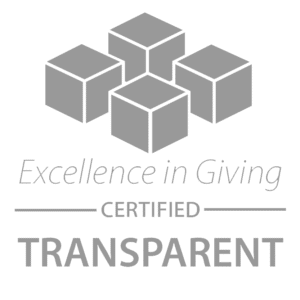You’re listening to Together by AGCI. I’m Marisa Butterworth.
Today, I’m talking with Angelyn Salyer, AGCI’s Ethiopia Program Director. Angelyn moved to Ethiopia this past summer to assist in opening the AGCI and Tim Tebow Foundation House of Hope in the capital city of Addis Ababa. In late September, I had the chance to connect with her while she was in Ethiopia. And today you get to hear more about the home, why we opened it, who it serves and how we think that this home and model of care will bring hope and healing to vulnerable children and families all around the world. Now, if you’ve been following the news, you’ve seen that Ethiopia is at war and has declared a state of emergency. It is not currently safe for our team to travel to Ethiopia. Right now, I’d like to ask you to please keep our Ethiopian team and their families, the precious girls that they’re caring for and advocating for at the House of Hope, all the kids and families in our educational sponsorship program, and everyone affected by this conflict, in your daily prayers. Now onto Angelyn and some good news from the House of Hope in Addis Ababa, Ethiopia.
Angelyn thank you so much for jumping on a call with me today. You are coming to us live from Ethiopia, which is a modern miracle because the wifi is actually working in Ethiopia and it means seriously, so much to me that you would, um, take the time this evening, where you are, um, to jump on a call with me and chat about all that you’ve been up to. Yeah, thanks so much for having me Marisa, what a joy it is to be able to join from here and that the time difference allows this to happen. And I’m just, I’m honored to be here and get to share more with you about what’s going on. So thanks for having me. Well, thank you. I feel so seriously. I love talking to you about this and I always appreciate that you’re so willing to, um, fill us all in. So in case someone missed our previous episode about Ethiopia, if you did, first of all, stop here and go back, find the episode and listen to that one first, because you might feel like you missed something otherwise. Um, but you are in Ethiopia and, um, specific stood. I can’t even talk specifically working on something called the house of hope for the last three and a half months of your life. You’ve been kind of flying back and forth. Isn’t that right? Three and a half months. Yeah. Yeah.
It just kinda hit me today or this week when I was thinking I had been here for two and a half months, and then I, um, realized I couldn’t do math and ended up in three and a half months. So yeah, I got here in the middle of June and we, um, started process of launching this new home and now we’re almost into October, which just feels, which just feels super surreal, but in the best way, of course, yes. I can’t even believe it. Can you quickly fill us in on what you and our AGCI Ethiopia team have been up to over there? Yeah, of course. Um, I, like I said arrived at the middle of June. However, this home has really been, um, a work in progress for the last two years. We, um, did a needs assessment, uh, in about, I think it was may of 2019 to really consider and think about, uh, intention to think about how we can expand our work in Ethiopia. And, um, the issues that really became really prominent to us where the issues primarily of girls who are living on the streets, separated from families or in institutions who have living family members, but for various reasons are unable to live with them. And so we, um, did a needs assessment and, um, thought that this was where God was leading us in expanding our initiatives in Ethiopia.
And so we prepped and planned for about two years. And when I got here in June, the house, we had already found the home. Um, and we really just had to finalize those last couple months of hiring our new staff, um, training our new staff, getting the home furnished, um, finalizing programming, all just the details of what goes into launching a home, which sounds funny to try to, you know, summarize it in a couple sentences. But, uh, it it’s been an honor to be here and to work alongside of our staff to, to really see this come to fruition. It’s been such a joy and it really like, it’s funny you’re doing it in a sound bite, but I know it was way more work than even all of that. Like all the time that you’ve all poured into, this has been, uh, just incredible to watch like kind of from afar and see how this has come together and really how God has like kind of orchestrated some incredible things, um, to make this actually come to fruition at this point, which through COVID especially has been like even more miraculous, but, you know, I think I’ve seen like God’s timing and all this. So it’s been cool to watch, even though it’s slowed down a little bit there for a bit.
Um, so you don’t have to go into all the ins and outs, um, of this, but how do girls, um, end up coming into the house of hope? Like, what are their ages typically? I know there’s some, uh, there are some different variables there and then, um, like, can you talk at all about what some of them like in general have lived through? Yeah, of course. So, uh, primarily the house of hope we’ll S will serve girls ages eight to 18 or eight to 17 about, um, girls who are currently residing in Addis Ababa. There’s an estimated around 600,000 children living on the streets throughout Ethiopia and about a hundred thousand of them they’re estimated to be living in Addis alone and how these girls get here or how these kids get here is, um, various reasons. But, um, mostly due to, um, poverty, uh, in the countryside and, um, family members just sending girls into this city out of desperation. Um, they, they have an assumption that, uh, there’s work in the city for children. And so, and often girls are the last in their family to receive an education. And so often girls are sent into the city, um, to find work. And many of them either, uh, wind up living on the streets, uh, or as how servants, um, sometimes even married off very young.
Um, and you know, there’s just obviously a lot of trauma that’s that goes into each of those situations. And so you have this huge population of kids and what I kind of refer to the girls living on the streets are, um, in these situations as the invisible, uh, children of Ethiopia, because oftentimes when you’re driving through the city, you might see all the street boys, which is of course its own situation, but girls are so vulnerable in so many ways. And they’re often kind of the invisible faces because they’re, um, in, um, domestic situations that are, you know, they’re, they’re, uh, just honestly experiencing so much trauma in so many ways either. Um, uh, you know, by their, by, you know, being home servants and being, you know, abused physically, mentally, emotionally, um, winding up on the streets. Um, even some of the girls that we’re seeing now come into the home have actually spent some time living at one of the government institutions. And again, these girls have living family, but when they get picked up by the police, there’s no reunification services provided by the government. And so the option is for them to live at an institution, a government institution. And, um, so what we found is that a couple of the girls, even that we’re serving now have been in government institutions for longer than a year, um, which is just obviously, um, horrible.
So, uh, yeah, that’s, that’s kind of the backstory of, of what the situation can be for girls. Um, the streets of why we’ve decided to, to intervene with this population, that’s amazing and heartbreaking. And I’m so glad that we’ve been able to get in there and start offering these services where there were none before. And, um, will you share with us what happens after the girls end up entering the home? What, what services do we offer at that point in the house of hope? Yeah, so, I mean, primarily our goal is to really provide a safe environment for these girls to heal and to prepare to reenter family care. There’s a lot that goes into that. Of course. Um, it’s a very holistic program in which we’re providing psychosocial support, education counseling, um, family life care. And we’re also working with the family to prepare the family for reintegration as well. Because a lot of times, like I said, the has just been aware of the trauma that their children might face coming into the city. And so we want to ensure that the family is well prepared to understand what might’ve happened or what did happen to their children, um, when they were separated. Um, like I said, some of them have been separated for years. And so we want to make sure that we’re training the family as well as the children on, um, understanding trauma, um, understanding how to best reconnect with children.
Um, you know, providing as much education, uh, to communities as well around preventing this from happening, uh, all over Ethiopia. And so basically we’re, we’re kind of trying to, trying to not only heal kids from the trauma that they face, but provide them with the love and care and that you need to be able to reenter the children. Are you there? I think I just lost you a little bit. Shoot. I’m sorry. Can you just say yes, I can. Um, we’re coming at, you live from Ethiopia, so bear with us because the wifi, there is always a miracle, but I think we got most of that Angelyn and, um, it’s just incredible to watch from afar. And I know I’ve just been praying so much for those girls, uh, as a mom that brought her daughter home from Ethiopia through AGCI, it was about, oh gosh, we’re coming up on almost nine years ago. I’ve always held that Ethiopia and team, um, that was at Hannah’s hope, our old AGCI home, uh, when we were able to do adoptions in Ethiopia, I’ve always held that team in such high regard, um, because they really like took care of my, my daughter and not just like care of her, like they loved her so much. Um, and they gave our family such a huge gift when she came home because she was able to attach to us so much faster because she had attached to them.
And it was something that I talk about a lot, but that I thanked them for. Like you gave us the most incredible gift. Will you tell everyone about who is now working at the house of hope? Um, because I know the answer, but no one else does. And I’m so excited for you to tell us this is one of my favorite pieces of the home and the work that we’re doing in Ethiopia is like you said, we had such an incredible staff at Hannah’s hope, and we actually have seven returning staff, um, from Hannah’s hope as well as our current staff, all of our staff, all of our current stuff before we launched house of hope have been with AGCI for over 10 years, they were all around during that adoption phase. And we had, like you said, a number of staff at that home. Um, and now we have seven returning staff. So that’s, um, we have three of our returning caregivers. Uh, we have our, um, one of our returning cooks, uh, Danny, who was, um, who was really involved in, um, you know, just working with the families day to day and driving. And now he’s our family searcher. We just, we have such an incredible staff, uh, that, that have returned and it just has made this whole team dynamic. So just easy.
I mean, we know that there’s going to be so many difficulties down the road, but to know that this team is already so well connected, they have such a great relationship already. Um, we trust them entirely and we are already seeing incredible work, um, in the lives of the girls that we’re serving at the home because we have such a phenomenal staff and it’s just been such a joy. I can, I can just, one memory I’ll keep with me forever is being here during the staff training a few months ago. And the moment of that, um, that everybody was, there was a big reunion. And, you know, we had team members who hadn’t seen each other in years and there were tears and there was joy and laughter and that excitement has honestly just continued every day and it’s so inspiring. And it just makes, um, makes the work that much more incredible. I love it. My gosh, I love it so much. And I wish I was a fly on the wall for that to see them come back together and, um, be working on this project together. And I should mention you kind of alluded to it, but it’s our same core staff that were there basically, um, when everyone was adopting. So it’s that same team that’s been caring for people in Ethiopia, all along that’s that is, they’re doing the same work right now, which I think is just incredible.
So when adoption closed in Ethiopia, they didn’t lose all of their jobs. There were definitely people that, um, we had to lay off because we didn’t have a home anymore. Um, but they continued their work serving the Ethiopian people and children and families, which is just incredible. So, Y um, you’ve kind of talked a little bit about it, but why is a home like this of it’s kind so important and what, uh, are the long-term goals, um, really for Ethiopia and the entire continent of Africa? Like, can you speak into that? How it, how are we planning on opening more homes? Are we, um, you know, what does this look like? Is Ethiopia partnering with, what are the, what are the goals and plans for this as we move into the future? Uh, wow. I could talk, I could talk for a long time about each of those aspects of this home, but I mean, really, like I kind of mentioned this home is so important because these are the most vulnerable children in Ethiopia. They, um, they’re separated from family, uh, and living on the streets or in institutions without the support and resources, they need to get back home. And many of them, like I said, I’ve undergone such severe trauma. Um, we know that 50% of youth living on the streets and ups have reported suffering either physical or sexual abuse, and those numbers are staggering.
We also know that less than 1% of orphan children and, and obviously Ababa or children who, uh, don’t have a living family member or a family to take care of them are United with a local adoptive family each year, their domestic adoption just hasn’t, um, uh, taken, uh, it hasn’t become as big as it needs to be here in Ethiopia. We also know that, um, adolescents living on the streets in Ethiopia are about 10 times more likely to contract HIV. And so there’s all these different factors that come into play once children enter the streets, and there’s not enough support right now. Uh, there’s not, and that’s not to blame the government. There’s just not a lot of resources. There’s not a lot of funding. There’s, there’s not a lot of support needed to, to help this population. And so we saw this as an area where we could really intervene, um, bringing in the trauma informed lens that we can bring in training our staff in trauma informed care and MTB RI and, um, really focusing on the healing aspects of all that it takes to heal children from this, because we know that a lot of programs around the world, um, who were unified the, you know, the work is, is difficult, but you know, that w you know, reunification people try to do it.
And, um, all in good faith, but a lot of times it fails because there’s not enough holistic work being done to help children heal from the trauma to help prepare families for that reintegration in communities. And so his approach to that was, um, really just providing a new model for intervening, for children who have been separated from families. And then, you know, on the other side of that equipping local leaders to scale this model to transform thousands of children across the country. So our long-term goal would, I mean, I can’t say exactly what’s going to happen in the next five to 10 years, but really with AGCI’s long-standing relationship with the government, um, we have a, you know, a really trusting relationship with them. We’ve proven ourselves to be effective in the work that we do. And, um, we feel that we can make a difference. And so we would love to not only expand, to reach more children, um, potentially open up more homes down the road and prove this model as effective, but also go deeper in that policy level and, um, create policies that equip local leaders to replicate this model and expand our reach to thousands of children. And on top of that training, local leaders and government leaders in trauma informed care, so that every policy that’s created long-term for children is rooted in, is this trauma informed care lens. And so we have big goals.
We have big dreams, but I think that with AGCI’s long-standing relationships here with our local staff who are actually, these are the people that are doing this work day in and day out. I will, I will say that. And I know you agree, Melissa, you’ve got the people that just are doing this hard work all the time. I’m just, I get to be a support system, which I’m grateful for, but, um, these people who commit their lives to this, like these are the people that are going to create this long-term change. And I think we have a lot of hopes, but we also think that all of this is possible through, um, yeah, through this work. So, and that team, we all know is the best of the best of the best. Like they have invested their lives in this work. And I totally agree with you. Like, um, and we’ve, uh, the cool thing is that, um, we’ve had success in this in Columbia. So we have seen, um, how this work just continues to spread and, um, how, when local leaders take this on as their own, um, then it, it continues to spread. And that’s where I was talking about, like, even through the continent of Africa, like it’s already starting, like people are grabbing onto the trauma informed care and the TPRI and what that does, because it really makes such a huge impact on the future of these kids.
And you were saying, sharing all these statistics, and that’s what this breaks. It breaks that cycle in their life where they do turn to other things to deal with all that’s happened to them. So it’s so, um, I just, it’s so incredible to watch, and I’m just so proud of our team there and all the work they’ve done and you and everybody, your state side that’s been supporting them. But so how, um, can people be involved in supporting the house of hope, like moving forward into the future? Yeah, I mean, well, first and foremost, of course, here at HCI, we believe in the power of prayer. And if you, if all of you who are listening can just be praying for our team. Um, as we enter into this new work, I, you know, I speak confidently about the work that we’re doing and about the staff, but that’s not to say that there will be challenges. There’s going to be a lot of. So if you could pray for our team on the ground, if you could pray specifically for the girls that are in the home, um, this is a safe space for them, but, um, it’s another change and another trauma in their lives to be transitioning from place to place.
And these girls have gone through way too much life already at their young ages and to be just to pray for healing and to pray for transformation and, um, to pray for restoration in their lives and in their lives of their family. Because if we can change one life and if we can impact community, then we can change generations. So even just one life. Um, yeah, and I mean, prayer is the biggest one right now. Uh, but just to be thinking about us and, you know, sharing what’s going on with AGCI with your friends and family, I mean, we, um, we think that, like I said, we believe in this work and we’re excited to invite you all into this and, um, share updates and just continue to stay involved, pray and stay involved is what I would love to be. Oh, totally. And I would also like mention, because this is the site that I work on. So I would also say like, we need sustainable funding, like yearly funding moving into the future. Um, we’re so thankful that we’re funded for this year. We’ve had incredible support. Um, I didn’t mention yet, but we’re, um, working with the team, Tim Tebow foundation, they have joined us in, in this, but we still need sustainable, yearly support that’s coming in from families.
So if you’re inspired, please, um, pray about it, think about it and, and talk to whoever you need to in your family about what it would look like, um, to, uh, have the house of hope, become a part of your own family and, and even your own family’s legacy and what that would look like, because this is important work. And I really, um, I believe in this so much as something that, um, will make really, um, true, a true impact on a country, because it’s, it’s something that they’re spearheading, um, which changes everything. So thank you seriously, Angelyn. And I just love you and admire you so much and believe in everything that you do, and I know your heart and I just, um, want to thank you for taking the time to jump on and share with everyone. Um, and I know it’s getting a little later there and easy opiate, but our wifi held out, like for the most part, which is just miraculous. I can literally spend all day talking to, you’re probably like, okay, Reza, thank you. Well, you know, I wish you were here with me, right? I have all of our moments in Ethiopia. I cherish and it seemed misses you. We all, we all miss you. We can’t wait until you get to be back on the ground to see the work.
And we’re obviously one of my favorite people to talk to about this, because I know your heart in this too. And I know your, your hope for preservation, for families and all that. You are, you just embody that. So thank you for taking the time to meet with me too, and yeah. At what a God thing to have wifi, just, we, you and I, we took a little bit of a risk here with that, and somehow it, somehow it panned out. So know we’re going to say thank you, Jesus. Well, I love you so much and now I’m all emotional. So thank you. Oh, thank you, Morris. I can’t wait to see you when I’m back. All right, love ya.
That was Angelyn Salyer, AGCI’s Ethiopia Program Director. To find out how you can support the House of Hope directly or read or watch even more stories, head to our website at www.allgodschildren.org. If you’d like to stay up to date on what exactly we need prayer for, we would love for you to join our prayer team. Just head to our website, scroll all the way down to the bottom of the page and tap on prayer team. You can join that from there and stay up to date on everything.
Thank you so much for listening to Together by AGCI. If you liked what you heard, make sure to follow us and rate us wherever you listen to podcasts. You can also follow us on Instagram at @allgodschildren. I look forward to sharing another story of hope the next time we’re together. Bye bye.










